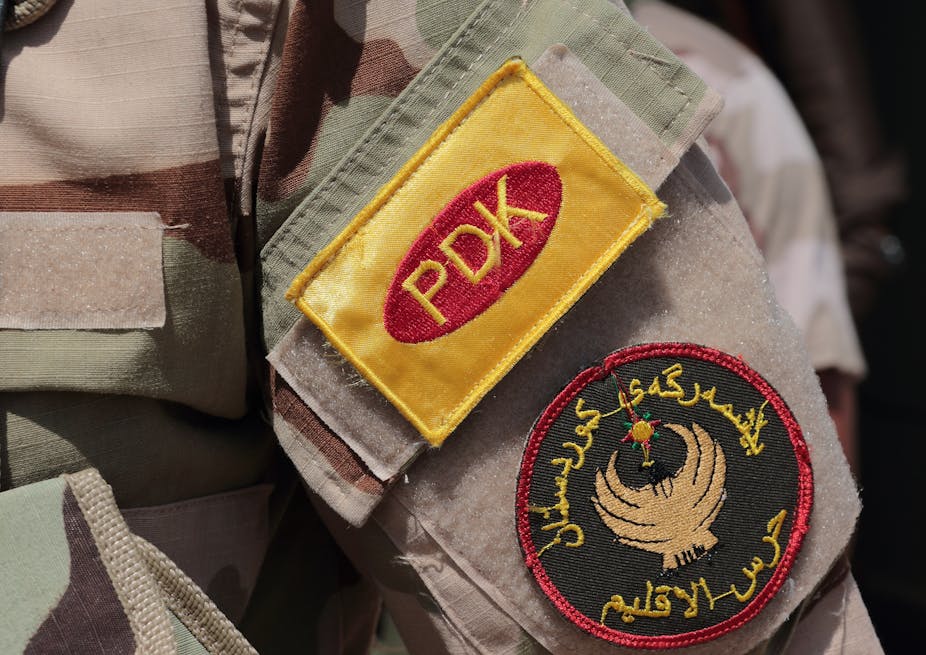Without the bloodshed and destruction associated with the Islamic state jihadis, one of Iraq’s constituent pieces is moving quietly towards establishing itself as a free-standing political entity. Massoud Barzani, president of Iraq’s Kurdish Regional Government (KRG), has asked the Kurdish parliament in Erbil to prepare for an independence referendum.
The idea of a referendum was proposed after the Kurds and Sunnis walked out of a parliamentary session intended to foster a national unity government last week when Shi'ites refused to replace Iraqi prime minister Nouri al-Maliki.
Barzani may not be seriously intending to go it alone. He may instead be using the threat of a referendum as a bargaining chip in ongoing negotiations with the Iraqi government. However, the idea of Kurdish independence is certainly gaining traction.
History of the Kurds
Currently, the KRG enjoys virtual autonomy under Iraq’s transitional constitution of 2005. However, many Kurds see independence as a sovereign right and as necessary to redress another long-standing wrong.
“Kurdistan”, a homeland for the Kurds, was mooted by the Allied Powers in the Treaty of Sèvres, signed by a chastened Ottoman Empire in 1920. But that treaty was never ratified, and a homeland was never forthcoming. Instead, the Treaty of Lausanne of 1923 left Kurdish-occupied land divided by borders and its population at the mercy of the nation-building projects of Iran, Iraq, Turkey and Syria.
Given the seemingly imminent fragmentation of Iraq, the Kurdish region’s relative stability and the fact that Kirkuk, the purported “Kurdish Jerusalem”, is now under Kurdish control, there appears to be an unprecedented opportunity for the Kurds to seek full independence. There are certainly many voices advocating such a move. Kurdish public opinion is abuzz at the prospect.
The Kurds are, for many, sentimental favourites in the Middle East on account of the dud hand they were dealt by colonial mapmakers and subsequent traumas visited upon them, not least the depredations of Saddam Hussein’s regime.
Sentiment alone, however, will not ensure the survival of a fledgling political entity. Regional dynamics and conditions on the ground also need to be taken into account when considering the long-term viability of a Kurdish state.
Welcome in a tough neighbourhood?
Regional players have long opposed a Kurdish state. Turkey has arguably been the most forthright opponent of an independent Kurdistan, fearing that a free-standing Kurdish state would incite Turkey’s own restive Kurdish minority.
These fears about the intentions of Turkey’s Kurdish constituents feed a conviction among many Turks that any political advance for the Kurds is to the detriment of Turks.
Times have changed, however. Turkey, having established extensive business interests in the Kurdish region, now stands as the most steadfast supporter of the KRG. Barzani recently said he is confident that Turkey wouldn’t attempt to stymie a Kurdish move towards independence.
The cosy Turkey-KRG relationship works to the benefit of both parties. Turkey’s ambitious program of re-engagement in the region, touted as guaranteeing “zero problems with neighbours”, has backfired given the unforeseen outcomes of the Arab Spring. Having lost clout in Sisi-led Egypt and amid the chaos of Syria, the Turkish government now looks on the Kurds as its staunchest allies in a troubled region.
Israel, for its part, is broadly welcoming of an independent Kurdistan. Israeli foreign minister Avigdor Lieberman has remarked that a Kurdish state is a “foregone conclusion”. Like Turkey, Israel sees the Kurds as a moderate (non-Arab) presence amongst belligerent neighbours.
What impact Israeli sanctioning of Kurdistan will have on Arab perceptions remains to be seen. In the past, military training of Kurdish units by Israel inspired conspiracy theories that Israel was manipulating the Kurds to foment disorder in the region.
Iran, on the other hand, has warned that it would not support a Kurdish move towards independence. Iran is determined to maintain its support for the Maliki government and a unified Iraq.

What next?
It is unclear what position the US would take if the Kurds went it alone. For now the US is clinging to the idea that a unified Iraq can be maintained. The US has refused to supply weaponry to the Kurds as a means of forestalling moves towards independence and is concerned that Turkey’s support for the Kurds is further entrenching divides within Iraq.
But the divisions within Iraq appear entirely unbridgeable. Among other disagreements, the Iraqi government is refusing to pay oil royalties due to the Kurds. This highlights what is perhaps the greatest current impediment to the Kurds striking out on their own: aside from oil reserves, the KRG can boast of little economic or industrial capacity. The Kurdish economy ticks along mainly due to the largesse of the Turkish government, which hopes to reap gains from future Kurdish oil production.
So while the sun may be shining on the Kurds, some observers are warning them not to get carried away with themselves.
A Kurdish proverb reads:
… when there are too many roosters, the village wakes up late.
For now, it appears that Kurdish roosters are unified and the village is well and truly awake. The KRG is proving stable and is acting as a safe haven for persecuted minorities in Iraq, but the road to statehood is a long one. While Iraq may be crumbling, the hour may not yet be here when the Kurds can confidently step out and create their own sovereign homeland.

